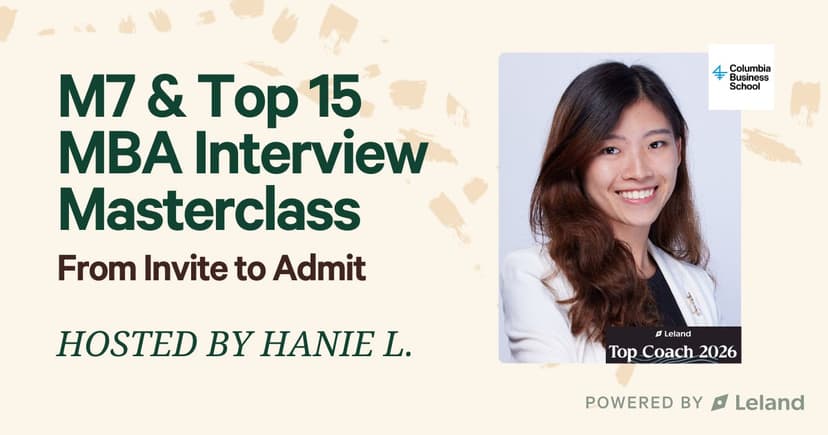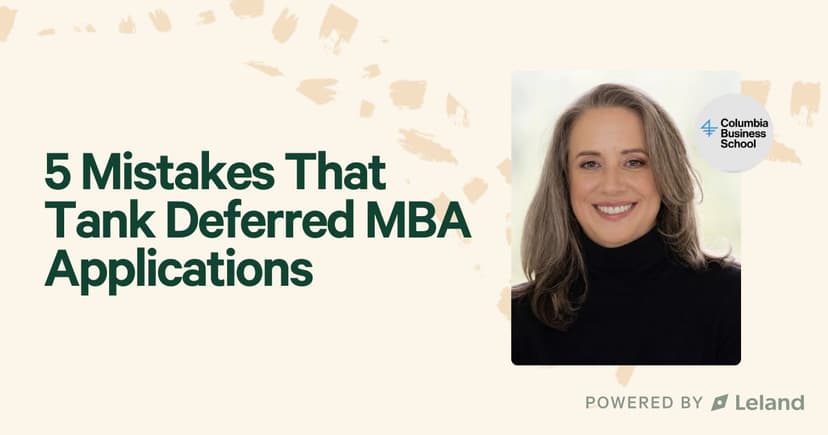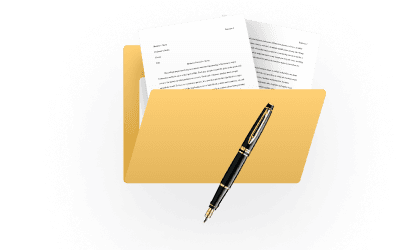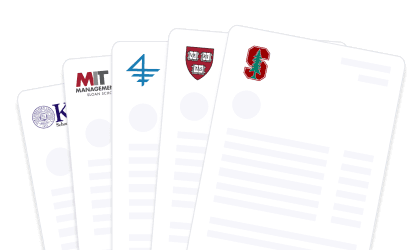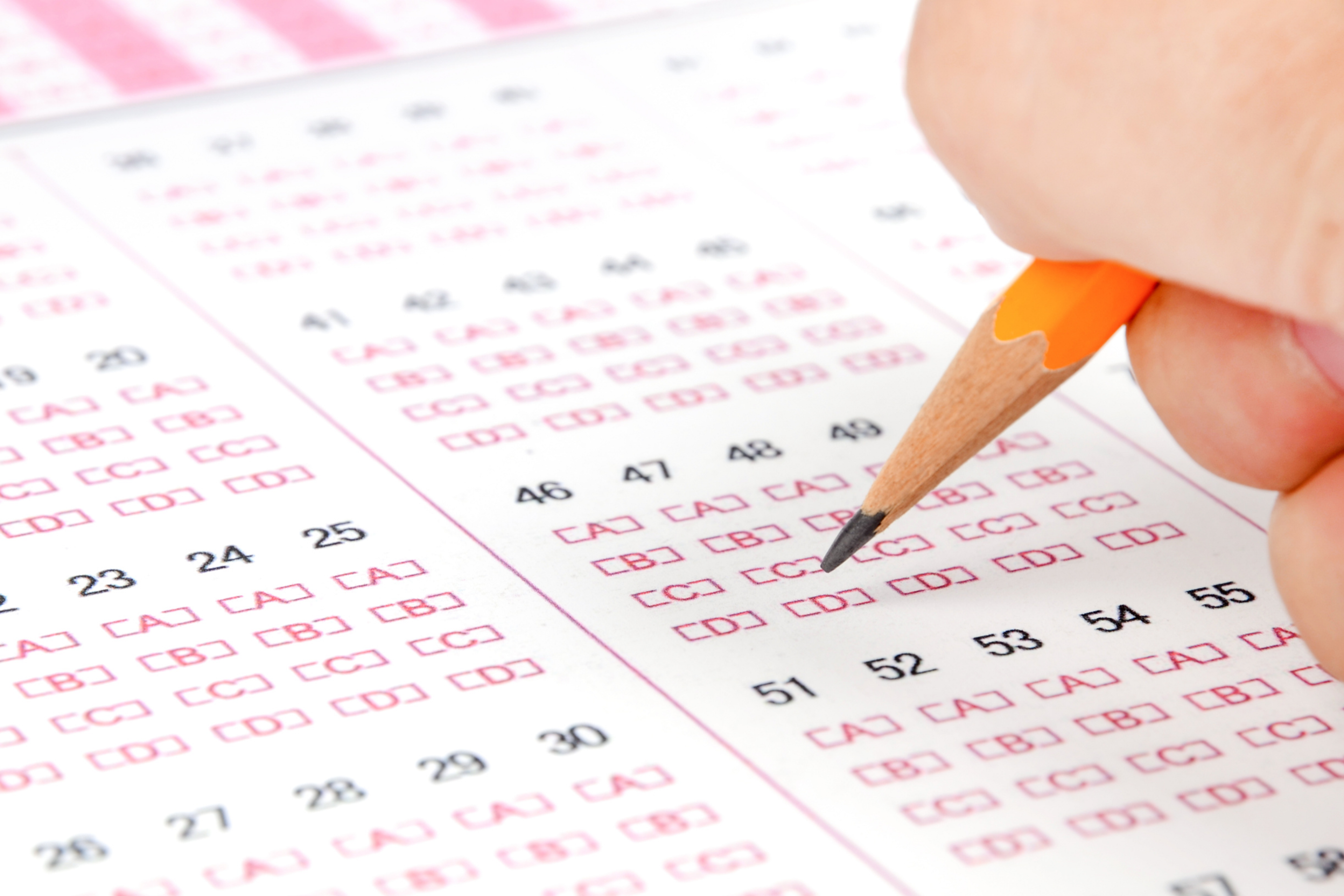How I Got Into Harvard Business School With Low Test Scores
Join Angel as she shares her personal story of overcoming low test scores to gain admission to one of the world's most prestigious institutions, Harvard Business School.
Posted June 13, 2025

Join a free event
Learn from top coaches and industry experts in live, interactive sessions you can join for free.
Table of Contents
The average test scores for top MBA programs are daunting. As if getting a top GPA wasn’t already stressful enough! I studied and strategized like crazy for the GRE, but after taking it multiple times, I was still below average. Time was running out so I pivoted to the other parts of the application. After gaining admission into Harvard Business School, The Wharton School of Business, and Columbia Business School, I learned that you do not need perfect test scores to get into your dream school. I optimized my application with the following three practices:
1. I didn’t “sell myself”
I owned my story and presented myself AS IS. I did not inflate my achievements, I did not use flowery language, I did not posture. I didn’t say anything that I did not truly believe in.
Admissions Committees read thousands of applications every year, so readers and interviewers are able to sense posturing from a mile away. Knowing this, I made authenticity my number one priority in my essays and interviews.
But before doing so, I had to understand myself as a person. How could my dream schools discover who I am if I stripped myself of self-discovery? Prior to beginning my essays, I took a deep dive into myself. I journaled, by hand, about the following topics:
- My major accomplishments in college
- My major accomplishments at work
- The biggest challenges in my life
- How I overcame and am overcoming those challenges
- My lessons learned
- My defining characteristics
- My dreams and aspirations
- Connecting the dots
After reflecting upon my journal entry, I realized that I would not be able to capture my full self if I started from my story with my college years. I had to go back further.
My essay began with my competitive dancer days in middle school, the injury I threw myself into, and the downward spiral I slid down. Yes – I wrote about my mistakes. I wrote about the good, the bad, and the ugly. Did this disqualify me? No – it made me a unique candidate who had the confidence to detail my mistakes and how they’ve shaped me into the person I am today.
I owned my story – failures, successes, and lessons learned – and tied them into my aspirations for the future.
2. I recognized the power of my Letters of Recommendation – and didn’t let my score be the star of the show
I knew my test scores were not impressive, so I focused on making every other aspect of my application as impressive as possible. My primary concern with my low test scores was having the appearance of being incapable, inadequate, and of lower quality than other applicants.
One way to virtually rule out this concern is through glowing Letters of Recommendation. There are two main components to consider with letters of recommendation: 1) who you ask and 2) what you provide them.
Who you ask
My recommenders were both close mentors whom I met through my job. When debating who to ask for a letter of recommendation, someone advised me: “Choose someone who has visibility into your projects and your impact.” The two individuals I chose not only had visibility into my projects and my impact, but they had also witnessed my growth through multiple years.
Another important aspect to consider is if these recommenders truly want what’s best for you. I was working in Southern California, and none of my target schools were anywhere in the vicinity. To this day, my two recommenders are the only people from work who know about my MBA future. I knew I could trust that they would give their best effort into my letters of recommendation and keep it between us because of prior conversations I had had with them and the strong relationships we have.
What you provide them
It may be easy to fall into the trap of thinking that the Letters of Recommendation are the easiest part of your application. Unfortunately, they are one of the most time-consuming components – if you do it right.
If you think from your recommenders’ perspectives, they have a lot on their plate: their job, their personal life, maybe even a family. Writing a quality Letter of Recommendation is no easy task, so my recommendation for you is to provide them with all of the materials that they could possibly need.
To clarify, you should not write the letter for them or tell them what to write. However, you can highlight certain parts of who you are and your themes for your application to ensure that the admissions committee has a holistic picture of who you are.
I provided my recommenders with:
- A matrix of my target schools with each one’s deadlines, questions, prompts, and guidelines
- A concise list of what each school was looking for
- My resume
- An “About Angel” document where I detailed stories from my work experience, leadership experiences, details on my aspirations for the future, and why I want an MBA
- Most importantly, a heartfelt thank you
3. I conducted a gap analysis on myself
I had low test scores in both the Quantitative and Verbal sections, so I was afraid that HBS would doubt my intelligence. However, I knew my essays and my Communication major GPA would demonstrate my qualitative abilities. My remaining concern was my quantitative abilities. Therefore, I demonstrated my quantitative strengths in other parts of my application.
Of course, I couldn’t add in years of quantitative work experience when I was only months away from a deadline. However, I highlighted my quantitative skills by sharing stories from the workplace in my essays and providing tangible examples of my quantitative expertise for my recommenders.
Through conducting a gap analysis on myself, I built a well-rounded profile, despite having low test scores. A standardized test is not the only way to demonstrate your skill set. In fact, it is just one of many ways you can showcase your abilities.
Ultimately, MBA programs choose applicants who will add the most value to their classes in the most diverse way possible. Although I am not a perfect-scoring candidate, I demonstrated my value through my essays, my interviews, and my Letters of Recommendation – which were all driven by my story.
If you’re eager to gain admission into a top business school, I’d love to coach you on Leland! Feel free to send me a message, schedule a free intro call, or dive right into a session by visiting my profile!
Read next:




